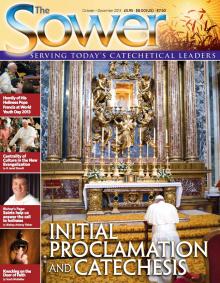‘On the Spot’ aims to highlight some of the complex positions, questions and comments experienced by Catechists, teachers and parents. It tries to outline the knowledge necessary to be faithful to Church teaching and which will best help those we teach who call us to account for the hope that is in us. [cf I Peter 3:15] This time we consider the relationship between the words we use for mission and the reality that underlies them.
Somewhere in England a small group of people meet for Mass each Sunday. Some of them are Catholics who belong to the Ordinariate of Our Lady of Walsingham; others are Diocesan Catholics who have found their way to the group for a variety of reasons. All are committed to the Mission of the Church - to bring people closer to God and guide them to share the life of grace in the Holy Trinity.
During the course of a meeting to discuss how to further and develop this work, it soon became apparent that the ex-Anglicans had a somewhat different outlook on 'mission' from those who had been part of the Catholic Church for a longer time. 'Mission' for them meant evangelisation and practical support; the proclamation of the Gospel in word and action to the whole local community, Christian or not, in which they found themselves. For the Catholics of longer standing, although this outlook was certainly included, 'mission' was a term more likely to evoke the concept of outreach to those Catholics who no longer practise their faith. The term ‘mission’, so widely used among Catholics, one with which all were familiar, was not resting on a shared understanding to the extent we had expected. The status of the Church of England as the national church had given those who were once part of it a sense of responsibility towards the wider community so that there was little distinction of thought between those who belonged as a result of Baptism and those who simply lived in the Parish. For the Diocesan Catholics, living with echoes of persecution and marginalisation from the past, there was arguably a more conspicuous sense of being part of a larger family. Those members of the family who had wandered away from it were sorely missed, and were the first to come to mind when mission was mentioned, though a wider outreach was also included.
This is perhaps too blunt a description of the viewpoints and does not do justice to the depth of discussion or the nuances of understanding, but there was a degree of substance to it that had to be addressed. It was a useful indication of how even those who are most closely bound through belief can hold a significantly different understanding of the language we use in both evangelisation and catechesis. At least when we speak with the lapsed, we can assume a certain level of familiarity with the terms we use, but in speaking with other Christians, that is not necessarily so, and naturally with those who have had minimal contact with Christianity, we cannot assume very much understanding at all.
The rest of this online article is available for current Guild members.
This article is from The Sower and may be copied for catechetical purposes only. It may not be reprinted in another published work without the permission of Maryvale Institute. Contact [email protected]

















